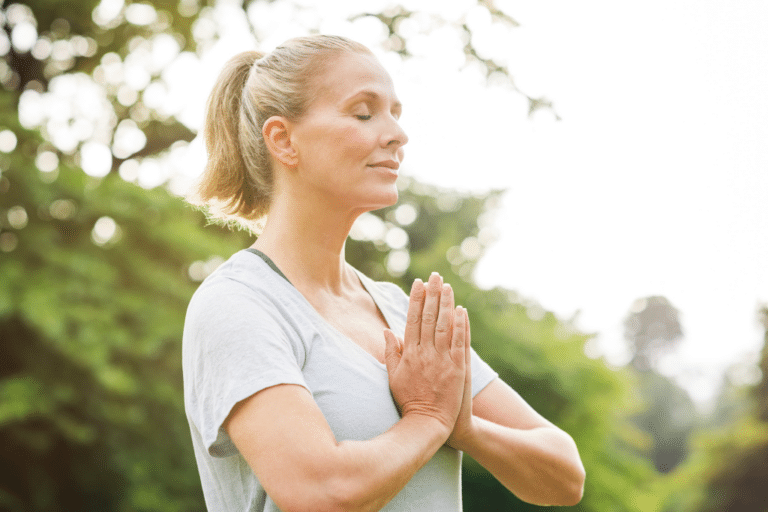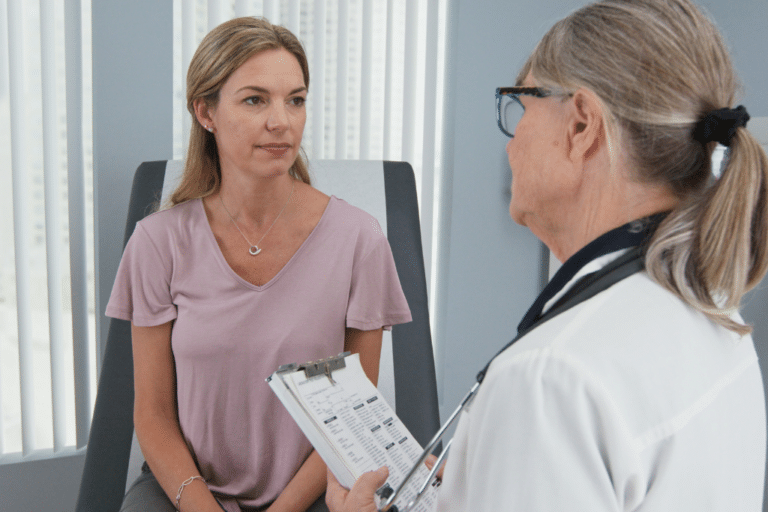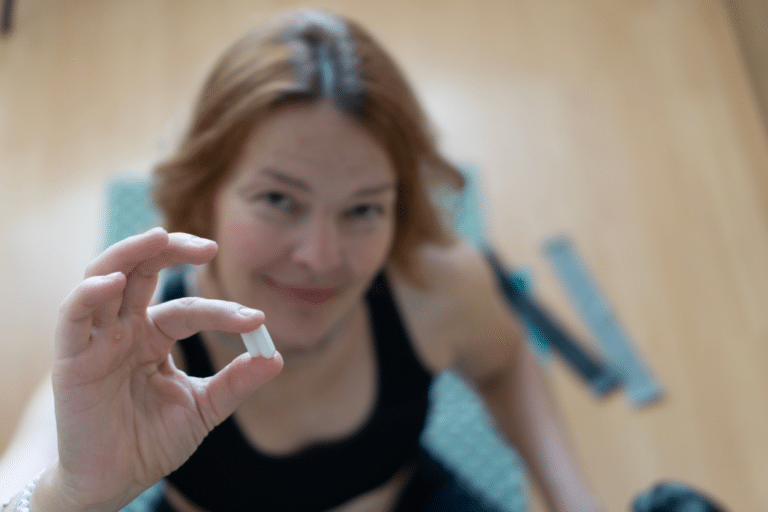Let’s face it—when most people hear the word biohacking, they picture a 30-something Silicon Valley guy chugging butter-laced coffee, rucking for miles on the daily, and injecting himself with the latest peptide in the name of “performance optimization.” And while some of that might work for him, it doesn’t mean it works for you.
Biohacking isn’t just for bros. And it’s definitely not one-size-fits-all—especially when it comes to women’s health.
For women in midlife, the conversation around aging, performance, and longevity needs a serious rewrite. The strategies that actually support long-term vitality for women are grounded in real science, hormonal nuance, and daily consistency—not flashy gadgets and extreme protocols.
So, what is biohacking, really? At its core, biohacking is about intentionally modifying your environment and biology to optimize health and performance. When you peel away the hype, what you’re left with are often evidence-based strategies for aging well.
Here are longevity strategies that actually work for women—and yes, they’re technically biohacks (just without the tech-bro energy):
1. Master Your Mitochondria with Movement
Mitochondria—the energy powerhouses in your cells—decline with age, especially after menopause. Exercise, particularly strength training and high-intensity interval training (HIIT), has been shown to boost mitochondrial function, increase insulin sensitivity, and preserve muscle mass—critical for longevity.
💪 Hack it like a woman: Focus on building muscle, not shrinking your body. Resistance training 2-3 times per week improves metabolic health, maintains muscle and bone and reduces risk of age-related diseases (Nelson et al., 2007).
2. Prioritize Protein
Protein needs increase with age, yet many women under-consume it. Sarcopenia (age-related muscle loss) begins in your 30s and accelerates in your 50s—unless you fight back. Higher protein intake (1.2–2.0g/kg/day) supports muscle maintenance, metabolic function, and bone health.
🥩 Hack it like a woman: Spread protein across meals and aim for 25–30g per meal and 20g per snack. Add resistance training, and you’ve got a powerful longevity combo (Bauer et al., 2013).
3. Balance Hormones—Don’t Just Track Them
Hormonal shifts in perimenopause and menopause impact everything from sleep and bone density to brain health and cardiovascular function. Optimizing estrogen, progesterone, and testosterone—when appropriate—can significantly enhance healthspan.
🧬 Hack it like a woman: Consider working with a provider trained in hormone replacement therapy (HRT), functional medicine, or integrative women’s health. Bioidentical hormones, prescribed and monitored appropriately, have been shown to reduce risk of osteoporosis, improve mood, and enhance cognition (The NAMS 2022 Position Statement).
4. Support Your Circadian Rhythm
You don’t need a $400 sleep tracker to tell you what your body already knows: if your sleep sucks, your health suffers. Having said that, I personally use an Oura ring to track my sleep because I am interested in understanding how lifestyle changes impact the various stages of my sleep.
🛌 Hack it like a woman: Go to bed and wake up at the same time daily, dim lights after sunset, avoid blue light 1–2 hours before bed, and consider magnesium glycinate or glycine for better sleep (Garrido et al., 2019).
5. Track What Matters (But Ditch the Obsession)
Yes, data can be empowering—but it can also be overwhelming. Continuous glucose monitors, HRV trackers, and wearable tech can be helpful if they lead to behavior change. But for many women, especially perfectionists, too much data can backfire and create anxiety.
📊 Hack it like a woman: Start with the basics: labs like fasting insulin, lipid panels, vitamin D, hsCRP, and hormones. Use wearables if they help you sleep better or move more—not just because they’re trending.
6. Feed Your Gut (and Your Microbiome)
Your gut health influences your mood, immune system, hormones, and even how you age. The diversity and resilience of your microbiome play a critical role in inflammation and disease risk.
🥕 Hack it like a woman: Eat 30+ different plant foods per week, include fermented foods like yogurt or kimchi, and reduce ultra-processed foods. Gut health is the quieter but mightier biohack (Johnson et al., 2021).
7. Redefine Recovery
You don’t need to cold plunge your way to a longer life. But you do need to regulate your nervous system. Chronic stress ages us fast—affecting inflammation, hormones, and brain health.
🧘♀️ Hack it like a woman: Try yoga, vagus nerve stimulation, breathwork, nature walks, or even dancing in your kitchen. These are all legit tools to activate your parasympathetic nervous system.
The Bottom Line
Biohacking isn’t about cold plunges, red light masks, or 20-step supplement regimens. It’s about tuning into your body, supporting what’s already working for you, and making evidence-based choices that honor your biology.
Women aren’t small men—we have unique hormonal needs, emotional landscapes, and social pressures. Real longevity for women is built on muscle, mindset, sleep, community, nourishment, and empowered choices.
So no, biohacking isn’t just for bros. It’s for women who are ready to live long, live strong, and feel good doing it.
Want help crafting a biohacking plan just for you—based on your hormones, genetics, and real-life schedule? Let’s talk.
References
- Nelson, M. E., et al. (2007). Physical activity and public health in older adults: recommendation from the American College of Sports Medicine and the American Heart Association. Circulation, 116(9), 1094–1105. https://doi.org/10.1161/CIRCULATIONAHA.107.185650
- Bauer, J., et al. (2013). Evidence-based recommendations for optimal dietary protein intake in older people: a position paper from the PROT-AGE Study Group. J Am Med Dir Assoc, 14(8), 542–559. https://doi.org/10.1016/j.jamda.2013.05.021
- The North American Menopause Society (2022). 2022 Hormone Therapy Position Statement. https://www.menopause.org/docs/default-source/professional/nams-2022-hrt-position-statement.pdf
- Garrido, M., et al. (2019). The Role of Magnesium in Sleep Health: A Review of Available Literature. Nutrients, 11(4), 910. https://doi.org/10.3390/nu11040910
- Johnson, A. J., et al. (2021). Daily Sampling Reveals Personalized Diet-Microbiome Associations in Humans. Cell Host & Microbe, 29(7), 1084-1097. https://doi.org/10.1016/j.chom.2021.04.015
Dr. Anna Garrett is a menopause expert and Doctor of Pharmacy. She helps women who are struggling with symptoms of perimenopause and menopause find natural hormone balancing solutions so they can rock their mojo through midlife and beyond. Dr. Anna is the author of Perimenopause: The Savvy Sister’s Guide to Hormone Harmony. Order your copy at www.perimenopausebook.com.
Dr. Anna is available for 1-1 consultation. Find out more at www.drannagarrett.com/lets-talk




